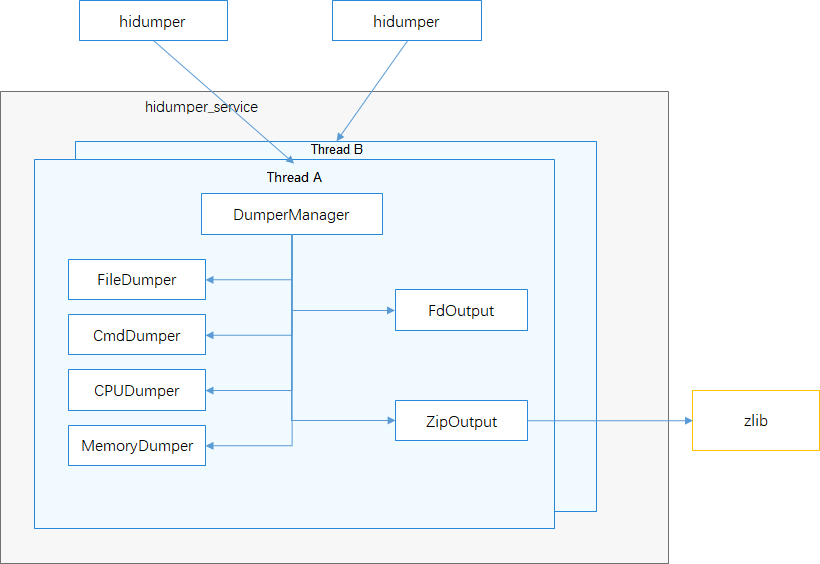# HiDumper
- [Introduction](#section11660541593)
- [Directory Structure](#section161941989596)
- [Usage](#section1312121216216)
- [How to Use](#section129654513264)
- [Repositories Involved](#section1371113476307)
## Introduction
HiDumper is a unified system information collection tool provided by OpenHarmony for development and test personnel to analyze and locate faults.
HiDumper consists of the following modules:
- hidumper: Serves as the executable program of HiDumper, which receives user input and communicates with the server.
- DumpManager: Serves as the manager of HiDumper, which provides functions such as information classification, command request distribution, and information collection.
- Dumpers: Exports various information, including file information, command information, CPU usage, and memory usage.
- Output: Outputs various contents. This module consists of two parts: FdOutput for standard output or file output and ZipOutput for compressed output.
**Figure 1** HiDumper architecture

## Directory Structure
```
/base/hiviewdfx/hidumper
├── client # Client code
│ ├── native # Native code
├── frameworks # Framework code
│ ├── native # Core function code
| | |── include # Header files
| | |── src # Source files
| | |── common # Common function code
| | |── executor # Process executor code
| | |── factory # Factory code
| | |── manager # Core manager code
| | |── util # Utility code
|── sa_profile # HiDumper SA profile
|── services # HiDumper service code
| |── native # C++ service code
| |── zidl # Communication function
| | |── include # Header files of the communication function
| | |── src # Source code of the communication function
├── test # Test cases
│ ├── unittest # Unit test code
│ ├── moduletest # Module-level test code
```
## Usage
During OpenHarmony application development, you can use HiDumper to query system information, service information, and process stack information, and then use the information to analyze and locate faults.
### How to Use
HiDumper helps you export basic system information to locate and analyze faults. When passing complex parameters to sub-services and abilities, enclose parameters in double quotation marks.
The procedure is as follows:
1. Access the device CLI, and run the **hidumper -h** command to obtain the help information, which includes basic information and function syntax.
```
hidumper -h
```
2. Run the **hidumper -lc** command to obtain the system information cluster list.
```
hidumper -lc
```
3. Run the **hidumper -c** command to obtain all information that is classified by **base** and **system**.
```
hidumper -c
```
4. Run the **hidumper -c [base | system]** to obtain the system cluster information that is classified by **base** or **system**.
```
hidumper -c base
hidumper -c system
```
5. Run the **hidumper -ls** command to obtain the system ability list.
```
hidumper -ls
```
6. Run the **hidumper -s** command to obtain all system ability information.
```
hidumper -s
```
7. Run the **hidumper -s 3301 -a "-h"** command to obtain the help information about the ability whose ID is **3301**.
```
hidumper -s 3301 -a "-h"
```
8. Run the **hidumper -s 3008** command to obtain all information about the ability whose ID is **3008**.
```
hidumper -s 3008
```
9. Run the **hidumper -e** command to obtain the crash information generated by the Faultlog module.
```
hidumper -e
```
10. Run the **hidumper --net** command to obtain network information.
```
hidumper --net
```
11. Run the **hidumper --storage** command to obtain storage information.
```
hidumper --storage
```
12. Run the **hidumper -p** command to obtain process information, including the list and information of processes and threads.
```
hidumper -p
```
13. Run the **hidumper -p 1024** command to obtain information about the process whose PID is **1024**.
```
hidumper -p 1024
```
14. Run the **hidumper --cpuusage [pid]** command to obtain the CPU usage information of the process whose PID has been specified.
```
hidumper --cpuusage
hidumper --cpuusage 1024
```
15. Run the **hidumper --cpufreq** command to obtain the actual operating frequency of each CPU core.
```
hidumper --cpufreq
```
16. Run the **hidumper --mem [pid]** command to obtain all memory usage information of the process whose PID has been specified.
```
hidumper --mem
hidumper --mem 1024
```
17. Run the **hidumper --zip** command to compress data to the **/data/log/hidumper** directory.
```
hidumper --zip
```
18. Run the **hidumper --mem-smaps pid [-v]** The pid parameter is mandatory.Run the following command to query the detailed memory usage of a specified process.
```
hidumper --zip
```
## Repositories Involved
[DFX Subsystem](https://gitee.com/openharmony/docs/blob/master/en/readme/dfx.md)
[hiviewdfx_hilog](https://gitee.com/openharmony/hiviewdfx_hilog/blob/master/README.md)
[hiviewdfx_faultloggerd](https://gitee.com/openharmony/hiviewdfx_faultloggerd/blob/master/README.md)
[hiviewdfx_hidumper](https://gitee.com/openharmony/hiviewdfx_hidumper/blob/master/README.md)